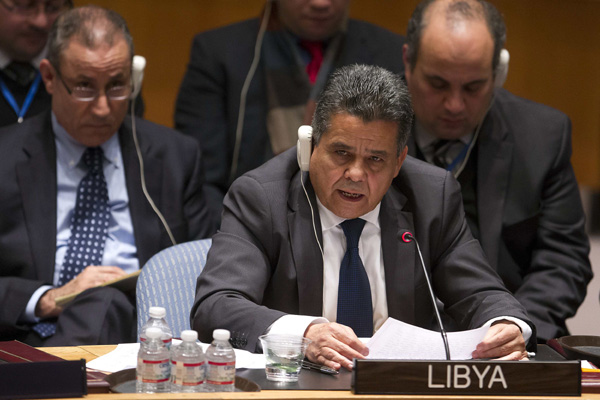Libya appeals to UN for aid in combating terrorism
Updated: 2015-02-19 13:45
(Xinhua)
|
|||||||||||
 |
|
Libyan Foreign Minister Mohamed Dayri speaks during a United Nations Security Council meeting about the situation in Libya in the Manhattan borough of New York February 18, 2015. [Photo/Agencies] |
UNITED NATIONS - Libya urged the UN on Wednesday to develop a strategy to help defeat terrorism on its land by lifting the present arms embargo on it while blockading arms for extremists.
The plea came after the release of a video earlier this week showing that 21 captive Coptic Christians from Egypt were beheaded by a Libyan branch of the Islamic State (IS) extremist group.
Libya has been split east and west by fighting between two factions in the Mediterranean nation since the 2011 ouster of long-time leader Moammar Gadhafi.
Its parliament has been forced to move from the traditional capital of Tripoli to Tobruk.
The special representative of the UN secretary-general, Bernardino Leon who is head of the UN Support Mission in Libya, briefed the council by teleconference on recent events, including the beheadings. The UN Mission is a political mission to assist security, democratic transition and economic recovery.
"The savage terrorist attacks highlight once again the imminent danger confronting Libya, its people and the wider region unless there is a swift agreement among the main parties in the country resolving the political crisis and bringing an end to the military and political conflict," he said. "We have witnessed a blatant disregard by Islamic State elements for Libya's sovereignty and state institutions."
Leon said the capture of public installations and the January attack on a Tripoli hotel, "reflect a growing ability by the Islamic State to exploit the political crisis and consequent security vacuum to consolidate its presence and influence across Libya."
"Recent incidents including (those) on the oil fields ... clearly demonstrate the increasing ability of the Islamic State and other terrorist groups to operate in different parts of the country."
"Terrorism is a serious phenomenon that is a threat to the stability of states and their security. Here we are dealing with a front that is stretching from the Middle East through to North Africa and covering the Mediterranean area and the Sahel and this shows that no one in those regions is free from this phenomenon," Libyan Foreign Minister Mohammed al Dairi said at the open council meeting.
The Islamic State not only kills innocents, but also destroys economies and serves "as a safe haven for terrorists from various nationalities and this is a threat to Libya and also other states and more specifically our neighboring states," he said.
Looking forward to "a national dialogue" on the "complex situation" in Libya, al Dairi said, "The need of the Libyan army has become even more urgent, more so than in the past."
"First of all, we must deal with all the Libyan terrorist groups," he said, adding that the international community must lend support by helping to arm the military. The challenges facing the legitimate authorities of Libya are enormous now that armed terrorist groups have taken possession of whole cities in Libya and proclaiming al-Qaida doctrine."
Al Dairi said the extremists also have attacked several oil fields and want to make his country "a hub for their terrorist action in North Africa, the Sahel and in the Mediterranean basin."
"The situation in my country is threatening the countries of the region in Africa and it is also threatening Europe. Libya needs a decisive stance from the international community to help us build our national arms capacity and this would come through lifting the embargo on weapons so that our army can receive material and weapons so as to deal with this rampant terrorism," he said.
Al Dairi also called for strengthened cooperation between countries in the region on illegal cross-border trafficking of arms, but not "an international intervention."
His plea was echoed by representatives from such neighbors as Algeria, Egypt and Tunisia and Libya's nearest European neighbor Italy.
The foreign minister also expressed the hope that Jordan would be able to introduce a draft resolution on Libya's needs to the council soon.
Related Stories
Egypt planes strike IS group in Libya 2015-02-17 07:48
Egypt says it bombed Islamic State targets in Libya 2015-02-16 14:51
Egypt confirms killing of 21 Christians in Libya by IS 2015-02-16 08:54
3 killed as IS affiliates launch attack on Libya hotel 2015-01-27 20:10
Thirteen Egyptian Christians kidnapped in Libya 2015-01-04 08:49
7300-dwelling-unit Project in Libya 2014-12-29 14:56
Today's Top News
Austria on alert following Denmark terror attacks
Rouble's fall to hurt weather forecast: Meteorological center
S Korea top choice for Chinese holidaymakers
UN Security Council slams IS murders of 21 Egyptians
Danish police kill gunman suspected of shootings
Michele Ferrero, maker of Nutella, dies on Valentine's Day
Italy closes Libyan embassy
8th Europe-Ukraine Forum held
Hot Topics
Lunar probe , China growth forecasts, Emission rules get tougher, China seen through 'colored lens', International board,
Editor's Picks

|

|

|

|

|

|





